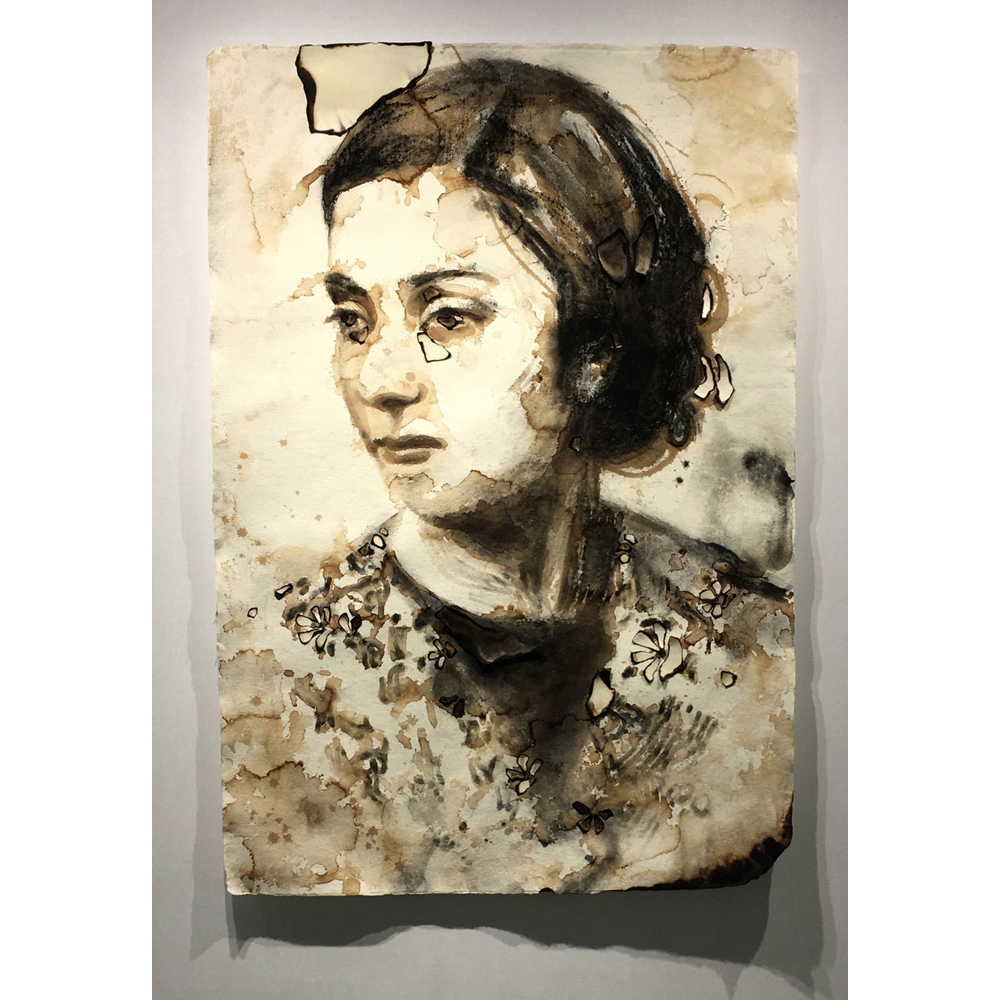Artwork Description
Monica Lundy – Donatella
Dimensions: 69 x 50″
Year: 2018
Media: coffee, burned paper and charcoal on Khadi paper
Artist Monica Lundy has spent her life living in different cultures, often cultures where the rights of marginalized members of society are squelched. She grew up in Saudi Arabia, and has lived between Italy and the United States as a mature artist. Lundy paints, burns, draws, and sculpts images of people she never knew, but took into her heart, from photographs and stories she gathered on her journey.
Lundy practices compassion for women who have been mischaracterized throughout history. Many of the women Lundy paints were inhabitants of mental institutions and jails in the early 1900s. She paints from photographs retrieved from psychiatric and incarceration files, always devoting only one portrait as a memorial to each woman. The root of Lundy’s compassion for her subjects comes from the injustices they suffered, such as being locked up for such “crimes” as promiscuity, disobeying their husbands, or being too loud. She does not judge or preach about the past treatment of these women in her paintings; she simply embraces the facts of life of women she never knew, embodying compassion by virtue of her attention. Monica “paints” with coffee and charcoal, incorporating these elements of everyday reality of the women into her creations, as if the shared materials help her better comprehend their reality. She uses fire as a transformative element of creation and destruction in the portraits she creates, almost as if this primal element has been used to both destroy and empower these (and all) women at different points in their lives. By using materials and presenting imagery of women who suffered unjustly in the past for “offenses” we regard as fully acceptable today, Monica Lundy helps us experience the feeling of interconnectedness that unites humankind.
As Buddhist teacher and psychologist Jack Kornfield points out, art is a channel that can elevate our happiness and the progress of our civilization:
We can see the fiction and the manipulation that often accompanies politics and the media’s attempt to scare us and capture our attention through our fears. We can also look around and see that there is enormous beauty in the world and zillions of acts of kindness at the very same time. Depending on what seeds we water and where we direct our attention, we can live in fear and confusion or we can activate many other powerful dimensions of our own heart and mind—of caring, confidence, equanimity, and well-being. These are innate in us and with care can be enhanced and awakened.
You ask, can changing your inner life make a difference in the troubles of the world? Nothing else can! No amount of technology, computers, Internet, artificial intelligence, biotech, nanotechnology, or space technology is going to stop continuing racism, warfare, environmental destruction, and tribalism. These all have their source in the human heart.
The outer developments that are so remarkable in our human world now need to be matched by the inner developments of humanity. These inner developments can awaken compassion for ourselves and others. They grow from loving attention and awareness, they develop a deep sense of interconnection, of care and social and emotional wisdom. This is the great task of modern times. To bring the inner level of human consciousness up to the level of our outer development. Nothing else will really make a difference.
Buddhist psychologist Jack Kornfield
Monica Lundy’s Donatella is part of her series ruminating on the incarceration of Italian women and girls during Mussolini’s fascist regime (1922 to 1943). Donatella is one of the works Lundy created during her time Rome, Italy. This project began in 2017 during Lundy’s residency at the American Academy in Rome, where she began working collaboratively with Dr. Annacarla Valeriano, a historian from the Foundation of the University of Teramo. Through investigating medical documents from the psychiatric hospital archives of Sant’Antonio Abate di Teramo, Dr. Valeriano has been unearthing the stories of daughters, mothers, wives, and lovers who were deemed unable or unfit to participate in society as determined by the demands of the Fascist Regime, and were therefore placed in the hospital.
These women were cited with symptoms such as “Nymphomaniac, irritable, unstable, flirtatious, devoted to idleness, unruly, talkative, inconsistent, irreverent, extravagant, capricious, excited, erotic, insolent, liar, impulsive, nervous, hallucinating, restless, petulant, sensational, threatening, red in the face, exhibitionist” to diagnose the mental illness called “female deviance.”
Lundy renders portraits of these women using coffee, burned paper and charcoal on handmade paper. The act of burning the paper is a cleansing act, the subject’s history is symbolically reduced to ashes and the surviving pieces are used to recreate their portrait.
“While creating the Deviance series, Lundy thought about the futility, rage, and shame the women must have felt, since many of them were not actually mentally ill but had been locked up because ‘society or their families didn’t know what to do with them.’ For Lundy, fire symbolically eliminates their identities and starts their lives anew. ‘It’s reminiscent of death, when we’re absolved of everything,’ she says. ‘There’s redemption in that, purification.’” – Jennifer Levin, Pasatiempo
-Shastyn Blomquist
Director, Turner Carroll Gallery

